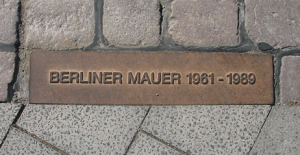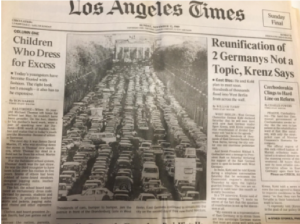This week’s installment concludes our series on the fall of the Berlin Wall. Enjoy!

Bobbie Kirkhart, Los Angeles
When I was very young, I imagined there was a wall just beyond my view, making sure I could not venture into the forbidden world. It made a strange shape, surrounding all the territory I could explore and blocking everywhere I could not. Perhaps it was that I was by far the youngest in my family, so that everyone else was an adult in my eyes and therefore free. Whatever the reason, I accepted as simple truth that I was banned from a world where everyone else was free to go. As I grew older, I realized that the wall was a metaphor, but I saw it as no less a reality in my life.
I was well into my 40s when that changed.
I had settled inside my metaphorical wall without thinking much about it. Everyone, after all, encounters limits. I saw no reason to rail against mine, at least I did not until the brave citizens of East Berlin showed me how to deal with walls.
As an American who had never been to Europe, the Berlin Wall had simply been a political symbol to me, a bitter statement of the Cold War. I was, of course, happy for its fall, admiring the courage of its destroyers, reveling in their joy. The more I watched, the more I realized this was not simply a political victory – it was, more than anything, a personal victory. The East Germans were the heroes, of course, but much of the world shared the triumph that was personal to each of us, empowering each of us. The world looked to the East Berliners because in destroying one wall, their example damaged many walls – some of them metaphorical.

Evangelia Kindinger, Berlin
I moved to Germany in 1990. When the wall had come down, I was an unsuspecting third-grader on a Greek island. I don’t remember any strong reactions from my parents, not even from my German mother. I now know that is has influenced her more than I thought, as she talks about visiting East Berlin as a teenager and reads a lot of literature about the division. I never experienced a geographically divided Germany and have to admit that this part of history does not affect me much. I can only guess how meaningful it was (and is) for those affected directly and indirectly. I just moved from Bochum to Berlin. Therefore, it is all the more present and visible now but still not part of my biography and history.

Lynette Kirschner, Lüneburg
I immigrated to Germany in 1988, and my first one and a half years were very eventful. On November 9, 1989, I was visiting my mother-in-law in Quakenbrück to celebrate her birthday the next day.
The birthday celebration, however, turned out differently than planned. We ended up glued to the television, watching the unthinkable unfold. When the East German official, Günter Schabowski, inadvertently opened the borders, we were flabbergasted. But if he did the unthinkable, so could we. We congratulated my mother-in-law before her birthday on the 10th (a very taboo thing in Germany), packed up our car, and drove to our apartment in Lüneburg, at that time a border town.
Berlin was swamped with Trabis, and Lüneburg was covered by the grey smoke of this very cute, but also very odorous car. The stores stayed open longer, people went out to greet the East Germans, and the first ‘couch surfing’ office opened that weekend. People left their address and telephone numbers at the tourist information center in case anyone from East Germany wanted to spend the night, free of charge. It was a euphoric experience. But I also remember the intensity of the evening: Pictures of people amassing at the Brandenburg Gate, the intensity of the live news coverage, and the very real fear that people would be shot or that a border skirmish might break out.
With hindsight, it is clear that the wall was going to fall at some point. However, despite the East German Head of State, Erich Honecker, resigning on October 18 and West German Secretary of State, Hans-Dietrich Genscher, giving safe passage to thousands of East Germans crowded in the West German Embassy in Prague and Budapest, the Wall was seen as immutable by everyone. Isn’t it great how things can change?

Maria Moss, Lüneburg
I was living in L.A. at the time, doing research on my Ph.D. thesis and trying to become a professional surfer. When I got home one day, I had a message on my answering machine from my friend Christiane: “Die Mauer ist weg.” The wall is gone? Which wall? THE WALL? In shock, I ran to the television set I shared with my roommates. In awe, I saw Peter Jennings in front of the Brandenburg Gate with people behind him jumping up and down ON THE WALL – apparently without getting shot.

People were waving flags – very unusual at the time – and the German national anthem was playing in the background – even more unusual. Peter Jennings explained that the anthem is part of Haydn’s famous Kaiser Quartet – something I never knew. The next day, people came up to me to congratulate me and tell me how wonderful they thought this was. I’ve always liked Californians, but on that day I truly loved them.

Monica Ortez, Los Angeles
I remember U.S. President Ronald Reagan’s trip to Berlin in June 1987 where he gave his famous, “Mr. Gorbachev, tear down this wall!” speech. And only a little more than two years later, I was in my apartment, glued to the television set, watching Germans from both West and East Germany hugging and crying. At Check Point Charlie, they were all over the wall, like hordes of ants on a mission, trying to get to the other side. Sledgehammers bashed against the wall over and over until it started to crack and crumble. They were “free at last.” I was also thinking of my good friend Maria Moss that night, as she did not live far from the GDR border near the Elbe River. How often has she dreamt of the two Germanys being one again.

Cheryce von Xylander, Berlin
I’d grown up in Berlin but was studying at Stanford when the Wall fell. Living in the Bay Area, a major earthquake struck in October of that year, killing 67 people. A few weeks later, the Berlin Wall fell – and no one was killed. To an insider looking on from the outside, the news from home was unintelligible in sentient terms. As scenes of a city no longer divided played out on television, the two events came to seem strangely connected. They felt similarly unexpected, overwhelming, and transformative. Seismic forces were at work in both settings, a transatlantic concatenation of progressive eruptions. The upshot: Berlin’s Mauerfall tips my personal Richter scale at 6.9!
20,630 Total Views, 8 Views Today






